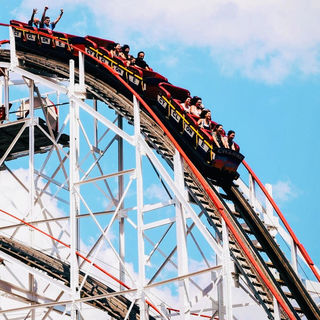Stress
The Emotional Roller-Coaster of a Digital Detox Vacation
There are three typical emotional stages of digital-free travel, a study finds.
Posted August 15, 2019
Earlier this summer, my 11-year-old daughter and I took a so-called "digital detox vacation" as part of a cross-country road trip. For exactly 96 hours (four days), our only form of modern-day telecommunications was the AM/FM radio in our rented camper. After a bumpy start—during which we both experienced some withdrawal symptoms—we had a laughter-filled traveling experience and bonded in a way that excessive screen time seems to inhibit. But, the "launch" and "re-entry" of our digital-free road trip was somewhat of an emotional roller-coaster ride.

Are you planning to disconnect from technology and social media for more than a day or two as part of a digital detox vacation in the final weeks of summer? If so, a recent study (Cai et al., 2019) published August 13 in the Journal of Travel Research offers some evidence-based insights about what to expect emotionally after "turning it off" during digital-free travel.
The interview-based findings by an international team of researchers corroborate my anecdotal "digital detox vacation" experiences and provide some clues about how to cope with the emotional journey of unplugging from technological devices for longer than 24 hours.
According to the parameters of this study, the guidelines for digital-free travel generally involve letting go of all access to 21st-century technologies; this includes smartphones, tablets, laptops, social media, WiFi, the Internet, and navigation apps.
Does the thought of going without access to any of these digital technologies at your fingertips make you feel uneasy or instantly disoriented? You're not alone. Most people in this study experienced withdrawal symptoms and anxiety soon after going digital-free.

For this study, three researchers (Cai, McKenna & Waizenegger) who have backgrounds in tourism and hospitality, information technology, and digital disconnection explored how digital-free tourism to urban and remote locations in 17 different countries impacted about two dozen travelers emotionally. The researchers also made themselves human guinea pigs in their experiment and took part in examining their own emotions before, during, and after being disconnected and reconnected after a period of digital detox.
After analyzing diary entries and conducting interviews with "digital detox" study participants, the researchers identified that, in general, there were three stages of going digital-free for more than a day. These stages could be summed up as (1) initial digital-disconnection withdrawal symptoms; (2) a period of acceptance accompanied by a sense of freedom; and (3) feeling overwhelmed by the quantity of missed incoming messages/emails when devices are turned on again after the digital detox vacation.
According to the researchers, two of their original study participants withdrew from the study after less than 24 hours because during the first stage of withdrawal, "they found the emotional experience unbearable."
"Some participants embraced and enjoyed the disconnected experience straightaway or after struggling initially, while for others it took a little bit longer to accept the disconnected experience," coauthor Brad McKenna said in a news release. "Many also pointed out that they were much more attentive and focused on their surroundings while disconnected, rather than getting distracted by incoming messages, notifications, or alerts from their mobile apps."
Based on the findings of the latest study by Wenjie Cai and associates, it's clear that my emotional response to taking a 96-hour digital detox vacation was typical. As Exhibit A, below is how I'd describe three stages of digital-free travel:
1) My daughter was born a few months after Steve Jobs announced the launch of the iPhone in 2007; she's never known a world in which her parents didn't have a smartphone within arms reach. Even though I've only been using a smartphone since her birth, the sense of free-floating anxiety, withdrawal symptoms, and fear of missing out (FOMO) immediately after disconnecting was pronounced. Suffice to say, we both felt like we'd lost a bodily appendage after we locked our cell phones in the glove compartment and made a vow only to use them in a dire emergency.
2) After a few hours of being unplugged, there was a growing level of acceptance, and I felt closer connectedness to my young travel companion—who had never driven cross country. As digital-free travelers, my daughter and I both felt a spirit of adventure (like we were pioneering the Wild West) and a thrilling "nobody knows where we are!" sense of liberation created by being off-the-grid.
Not having access to navigation apps and using an old-school paper map brought back vivid flashbacks to my first cross-country road trip as a 20-year-old college student, which made me feel young again. I was amazed by how much I loved having my daughter play "co-pilot" and navigate our route. It was fun to watch her flex her sense of direction and access previously-untapped orienteering skills by using a Rand McNally Road Atlas instead of relying on Google Maps.
3) After reconnecting to the Internet and checking my email account, I felt slightly overwhelmed and distressed that there were so many emails in my inbox that needed replies. Also, when I turned my phone on for the first time after four days, there were at least a half dozen "Where Are You?!? Hope you're OK." text messages expressing concern.

Obviously, letting friends and family know you're going "digital free" for a specific amount of time can minimize worry and contagious stress. Also, next time I go on a digital detox vacation, I'll set the email "away" message for slightly longer than I'm actually gone so I don't feel stressed about returning emails ASAP after returning to digitally-connected civilization.
Although the researchers don't offer specific advice on how to make the emotional roller-coaster of going digital-free less traumatic, based on my own experience (and their research), I have three recommendations: First, make a pact with a travel partner or someone still in the digitally-connected world about exactly how long you'll be digital-free so you can anticipate the beginning, middle, and end of your emotional journey. Second, understand that negative emotions during a digital detox are to be expected. Lastly, give yourself more time than you might expect to re-acclimate and get caught up on emails, so the sight of an overflowing inbox doesn't make digital re-entry overwhelming.
References
Wenjie Cai, Brad McKenna, and Lena Waizenegger. "Turning It Off: Emotions in Digital-Free Travel" Journal of Travel Research (First published: August 13, 2019) DOI: 10.1177/0047287519868314




